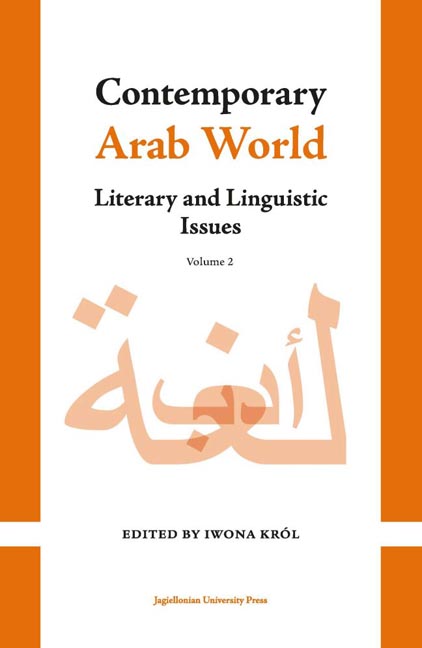Book contents
- Frontmatter
- Contents
- Introduction
- Karīm Maʿtūq and Other Winners of Amīr ash-shuʿarāʾ (Prince of Poets) First Contest
- Muḥammad Ibn Dāniyāl al-Mawṣilī – Arabic Aristophanes of Shadow Theatre
- Connotations of Home in Contemporary Palestinian Poetry – ʿAbd Allāh ʿĪsā’s Texts as an Example
- The “Mad Arab” Abdul Alhazred – Orient and Orientalism in the Works of Howard Phillips Lovecraft
- Functions of the Suffix -at in Nouns in Modern Standard Arabic
- Some Remarks on the Nature of Moroccan Regionalisms Based on the Analysis of University Admission Announcements
- Polish Deverbal Verbs and Their Hebrew Equivalents – A Contrastive Analysis Outline
- Annex: Abstracts – Streszczenia
- Miscellaneous Endmatter
The “Mad Arab” Abdul Alhazred – Orient and Orientalism in the Works of Howard Phillips Lovecraft
Published online by Cambridge University Press: 13 October 2023
- Frontmatter
- Contents
- Introduction
- Karīm Maʿtūq and Other Winners of Amīr ash-shuʿarāʾ (Prince of Poets) First Contest
- Muḥammad Ibn Dāniyāl al-Mawṣilī – Arabic Aristophanes of Shadow Theatre
- Connotations of Home in Contemporary Palestinian Poetry – ʿAbd Allāh ʿĪsā’s Texts as an Example
- The “Mad Arab” Abdul Alhazred – Orient and Orientalism in the Works of Howard Phillips Lovecraft
- Functions of the Suffix -at in Nouns in Modern Standard Arabic
- Some Remarks on the Nature of Moroccan Regionalisms Based on the Analysis of University Admission Announcements
- Polish Deverbal Verbs and Their Hebrew Equivalents – A Contrastive Analysis Outline
- Annex: Abstracts – Streszczenia
- Miscellaneous Endmatter
Summary
Howard Phillips Lovecraft (1890–1937) is one of the most important characters who shaped contemporary supernatural horror fiction – understood both as a literary and film genre, and an important element of popular culture. Although he was not commercially successful in his lifetime, Lovecraft inspired dozens, if not hundreds, of writers. Stephen King wrote about him:
Lovecraft … opened the way for me, as he had done for others before me … it is his shadow, so long and gaunt, and his eyes, so dark and puritanical, which overlie almost all of the important horror fiction that has come since.
A huge fan community has formed around the Cthulhu Mythos, the center and axis of the universe in which many of Lovecraft’s stories take place. The Great Cthulhu himself broke into pop culture with impetus and achieved popularity that its creator could only dream of.
The distinguishing feature of Lovecraft’s prose is the horror which has its source in a bottomless cosmic abyss, against which man is an insignificant element. Powerful beings inhabiting the void space influence their followers, whose rituals are to accelerate the arrival of the demonic Great Old Ones, which can tear our reality to shreds and end the existence of the human race. At least that is how it is recorded in the most sinister book of dark arts, that is, in the Necronomicon. According to the Cthulhu Mythos, the purported author of this filthy grimoire is to be the “Mad Arab” poet of the Umayyad period, Abdul Alhazred.
The Arab world appears ceaselessly in the works of Lovecraft. The inspirations of the Orient are very clear and they reappear in numerous stories. Some oriental threads (storylines) return, develop, and occupy an important place in the Cthulhu Mythos.
In this work, selected oriental themes in the literary output of the Loner from Providence will be presented. The book of Al-Azif and its author Abdul Alhazred are direct references to the Arab world, from which the author also drew some of the creatures that populate his horrors, including sinister ghouls. I will show how and for what purpose Lovecraft referred to the Orient, which perfectly matched the theory of orientalism proposed by Edward Said in his 1978 work.
- Type
- Chapter
- Information
- Contemporary Arab WorldLiterary and Linguistic Issues, pp. 53 - 68Publisher: Jagiellonian University PressPrint publication year: 2022

